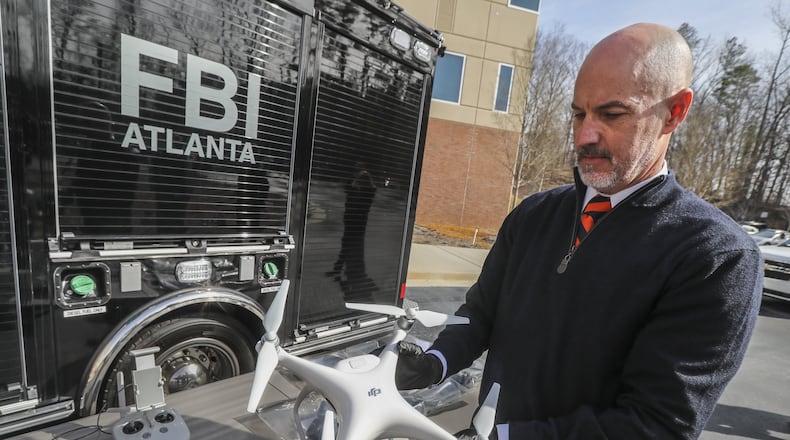Wear your favorite team’s jersey and bring all the football spirit you can muster. But if you’re planning to be anywhere near the Super Bowl on Sunday in Atlanta, leave your drone at home.
That’s the message from federal and local law enforcement this week: Atlanta is a “No Drone Zone” for the big game. Drones pose a safety risk, particularly when flown over large crowds of people, but six were still confiscated this week in violation of rules in place for the big game, the FBI said. Those pilots could be forced to pay large fines or spend time in jail.
So what makes drones so dangerous, and what can investigators do when one is spotted in the air? Though most drone pilots are likely hobbyists, perhaps trying to get a bird’s-eye view, in the wrong hands drones could be used for deadly acts. But law enforcement won’t discuss the methods being used to get an illegal drone out of the sky, including counter-drone technology.
“The least (dangerous) thing that could potentially happen is that one could fall out of the sky and hurt someone, and we certainly don’t want that to happen,” John Cronier, FBI special agent, said Friday.
RELATED: Super Bowl security plans top secret, but city is ready
ALSO: Someone flew a drone over the Falcons' Super Bowl practice in Houston
The FBI, Federal Aviation Administration and Atlanta police have repeated the “No Drone” policy for weeks leading up to the Super Bowl, and The Atlanta Journal-Constitution is among the local media outlets that have reported the mantra. But on Friday, the FBI said more work was needed to spread the word after several were found Thursday violating the regulations.
“It’s taken up a lot of time for our agents and law enforcement officers to be targeting these drones when they could be working on other security measures,” said FBI spokesman Kevin Rowson. “Frustration yesterday was at a very high level as we kept confiscating these drones.”
Some drones seen in the downtown skies are allowed, the FBI said. But those pilots completed the formal process of getting FAA approval to fly. Pilots whose drones were seized Thursday claimed they were unaware of FAA regulations, the FBI said. Those cases will now be turned over to the U.S. Attorney’s Office for further investigation, Rowson said.
“Drones can be fun and they also help carry out various functions for their owners,” said Michael O’Harra, FAA regional administrator for the FAA’s Southern region. “But we are most interested in having a safe airspace for the United States.”
Drones pose a risk for other aircraft, and Atlanta’s airspace is already busy, O’Harra told WSB Radio. For the Super Bowl, the FAA established Temporary Flight Restrictions, or TFRs, to keep drones away.
Since Thursday and through Saturday from 10 a.m. until midnight, drones are prohibited within a mile of Mercedes-Benz Stadium or below an altitude of 1,000 feet. On Sunday, the same rules are in effect until 5:30 p.m.. Then, the game day TFR goes into effect until midnight: No drones within a 30-nautical-mile radius of the stadium, up to 17,999 feet in altitude.
Beyond the risk to other aircraft, drones could potentially be used for terrorist acts, experts warn. When one is spotted in the air, it’s impossible to know the pilot’s intentions.
“If we’re talking about somebody who has nefarious intentions, who’s actually strapping something on to that drone — explosives, some type of poisonous liquid or powder — that’s a whole different ballgame,” Brian Fentiman, vice president of Blueforce UAV Consulting, said this week. “The amount of devastation that could cause in somewhere like a stadium is beyond imagination with something as small as a drone.”
Fentiman’s Canada-based company trains law enforcement on ways to reduce the potential dangers of drones, also called UAVs, or unmanned aerial vehicles. There isn’t a single solution to stopping drones from entering airspace, Fentiman said.
“There’s nothing you can point to, other than a physical barrier, that would prevent a drone from entering a space because there are different frequencies, different methods of control, different methods of navigation, whether it’s using GPS,” Fentiman said. “There are so many variables that it is literally impossible to cover all of those possibilities.”
Even though local enforcement won’t discuss the methods it will use to get drones out of the way for Sunday’s game, the eyes of hundreds of officers will be on the skies. It’s not worth the potential consequences, the FBI said.
“Suffice it to say that law enforcement has assets in place so we can protect the public from such threats,” Rowson said.
About the Author
The Latest
Featured



